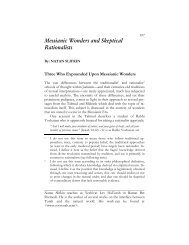Is There a Disconnect between Torah Learning and ... - Hakirah.org
Is There a Disconnect between Torah Learning and ... - Hakirah.org
Is There a Disconnect between Torah Learning and ... - Hakirah.org
You also want an ePaper? Increase the reach of your titles
YUMPU automatically turns print PDFs into web optimized ePapers that Google loves.
44 : Hạkirah, the Flatbush Journal of Jewish Law <strong>and</strong> Thought<br />
property of a fellow Jew, how would declaring their h<strong>and</strong>s ritually<br />
impure stop them? Perhaps they will just as likely ignore the laws of<br />
ritual purity <strong>and</strong> continue doing the service with impure h<strong>and</strong>s?<br />
Tosfos answers that even wicked people רשעים) who ignore the<br />
prohibition against damaging another person) take the laws of ritual<br />
purity seriously. As support for this, Tosfos cites an anecdote related<br />
by the Gemara in Yuma 23a in which a young Kohen stabbed another<br />
young Kohen who was in competition with him as to who would get<br />
to do the service. The Gemara relates that in the ensuing commotion<br />
the wounded boy’s father came running, <strong>and</strong> all present, including<br />
him, showed more concern with extracting the knife out of the still<br />
live body before the boy died <strong>and</strong> contaminated the knife, than they<br />
were with the act of murder. The Gemara in Yuma in fact declares that<br />
“the purity of the temple vessels weighed more heavily on them than<br />
did murder.” In the words of Tosfos:<br />
משום חשדי כהונה – וא"ת כמו כן לא יחושו לעשות בטומאה י"ל דאף לרשעים<br />
חמירא להו טומאה כדאמרינן ביומא (דף כג.) ללמדך שחמורה עליהן טהרת כלים<br />
יותר משפיכת דמים. (תוספות פסחים דף פה/א)<br />
Rebbe Shlome Wolbe ztz”l in a shmuess titled " " “On<br />
Frumkeit,” 46 offers some explanation for this phenomenon. In this<br />
shmuess he puts forth the thesis that there is a basic instinct, inborn in<br />
all creatures, each according to its level of ,נשמה to be “frum,” i.e. to<br />
want to come close to one’s Creator. Frumkeit is not ראת שמים , it is<br />
not a חסידות ,מדת nor is it<br />
. It is simply an instinct, <strong>and</strong><br />
like all instincts it is egotistical, i.e., concerned only with its own<br />
satisfaction, unthinking, <strong>and</strong> given to satisfaction through fantasy.<br />
The satisfaction of this instinctual drive, he writes, serves as the force<br />
behind many people’s mitzvah activities, <strong>and</strong> in a positive way, serves<br />
to help us carry out mitzvos in spite of hardships. However, because<br />
of its egotistical <strong>and</strong> unthinking nature, one cannot build one’s<br />
service to Hashem on this instinct. The frum instinct, no less than any<br />
other instinct, must be harnessed, <strong>and</strong> must be guided by rational<br />
thought, i.e., by <strong>Torah</strong> knowledge <strong>and</strong> halacha. If not, it will seek<br />
י<br />
,על פרוְּמקייט<br />
דקדוק במצוות<br />
46 Later written up as an article in ,הבאר a <strong>Torah</strong> journal published by<br />
Yeshivas Be’er Yaakov ( "ו ), <strong>and</strong> still later<br />
published in a somewhat digested form, but with some additional<br />
.עלי שור חלק ב insights, in<br />
כ "ה אלול תשל"ז חוברת ט
















